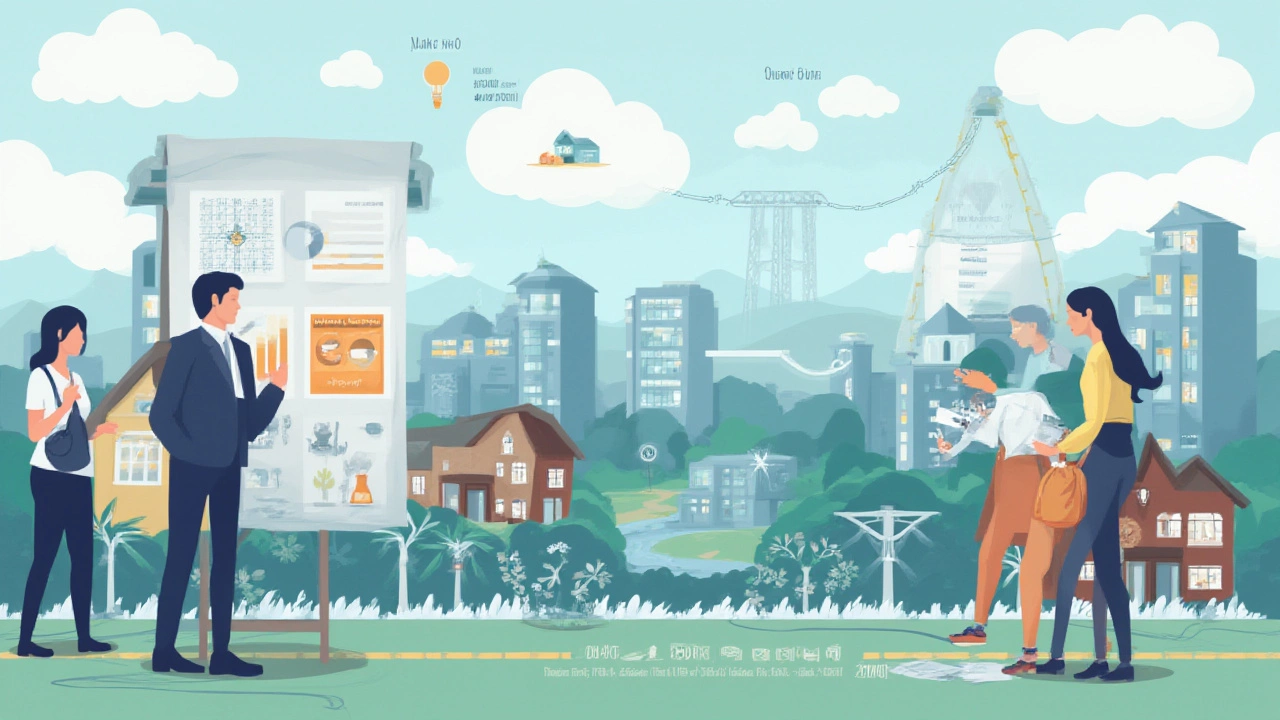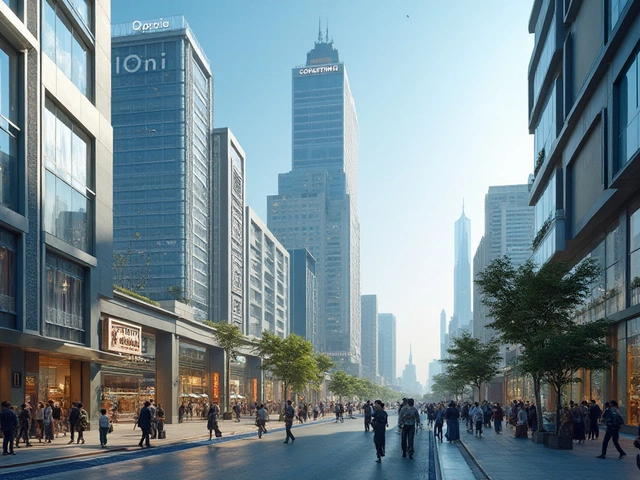Burning money or doubling it—that’s how real estate can feel, right? In Auckland, I’ve seen folks go from pinching pennies to living pretty just by picking the right side of the property game. But is commercial real estate a golden ticket, or does residential property actually offer more steady value in 2025? Let’s get under the hood and map out what matters most to regular people, families, and aspiring investors staring at the big property fork in the road.
Breaking Down the Basics: What Sets Commercial and Residential Apart?
The first tripwire for anyone curious about property is not even knowing what counts as commercial or residential. So, here’s the plain talk: residential property means homes where people sleep, eat, and binge-watch TV—think houses, units, apartments, and even the odd bach out by the beach. Commercial real estate covers shops, offices, warehouses, hotels, and little cafes down Ponsonby Road. Both are bricks-and-mortar, but the rules change the second you cross the driveway.
The bank looks at you differently, the taxman hands you a different slice of paperwork, and even your tenants behave in wildly different ways. In the residential world, leases usually run six to twelve months—Aurelia’s friends’ parents sometimes move every year for better school zones or lower rent. Commercial tenants usually sign long-term contracts—sometimes three, five, or even ten years—which sounds more secure, but there’s a catch (there’s always a catch, right?). If a commercial space sits empty, it could be months before a new business moves in. Try telling a bank you’ll survive five months with zero income; you’ll see a real poker face.
Another big difference is how you deal with regulations. In New Zealand, new Healthy Homes Standards chase down every leaky window and dodgy heater in rental properties. On the commercial side, the building code rules, but it’s often the tenant who's on the hook for fit-outs and repairs. Some commercial tenants even pay the rates and insurance. Here’s an interesting fact: in commercial leases (especially triple net leases), the landlord can end up with almost zero running costs. For investors, that’s like getting a rental with all the bills magically paid by someone else.
Crunching the Numbers: Entry Costs, Cashflow, and Risk
Let’s talk dollars and sense. Most people start in residential because it’s just way easier to get your foot on the ladder. In Auckland, the median house price cracked around $950,000 by mid-2025—daunting, sure, but still half the entry price for a half-decent commercial building in the same postcode. Banks want bigger deposits for commercial loans—often around 30-40%, compared to the 20% for houses. They’re betting you’ll stick with the safe bet of families needing homes, not rolling the dice on retail or warehouse demand.
That leads to the big payout difference: cashflow. Commercial properties can offer eye-watering yields—sometimes 6-9%. Houses and apartments? You’re lucky to see more than 3-4% after expenses. But don’t sprint for the calculator yet. When COVID-19 rolled through, Kiwi retail strips emptied overnight as businesses folded, but people still needed places to live, even under Level 4 lockdown. Vacancy rates for Auckland’s houses stayed under 3%. For retail shops, it peaked at nearly 12%. That’s a tough pill to swallow when the mortgage still needs paying.
So, you get bigger cashflow in commercial, but with bigger risks. A vacant warehouse hurts more than a flat without a tenant, because you might have to offer months of rent-free periods or splash out on incentives just to attract someone. My mate tried to fill a small office space in Takapuna last year—took seven months, and he still ended up bending on rent. That just doesn’t happen with a two-bedroom unit in Mount Eden; it’s snapped up in days if priced right.

Tenants, Troubles, and Time: Who Makes a Better ‘Customer’?
Now, let’s talk about people, because tenants can make or break your sanity. With residential, you get families, students, or professionals. They want homes that actually feel like homes, and there are strict rules on rent hikes, security deposits, and what you can and can’t ask tenants to do. If something breaks, you’re often on the hook to fix it—sometimes at 11pm, just as you’re trying to get the kids to sleep. The good news? Demand for rentals in Auckland has always been fierce; it barely cooled off during the worst of the pandemic, and as of July 2025, it’s still a landlord’s market.
Commercial tenants are different. They’re businesses first, people second. Leasing contracts are complicated—often looked over by lawyers on both sides. You’re protected by longer leases (so less day-to-day hassle), and you can pass on many outgoings, but if a tenant fails or goes bankrupt, you could be left in legal limbo. In 2023, several small Kiwi hospitality chains vanished almost overnight—landlords suddenly had to find new tenants or cop massive losses.
One sneaky advantage in commercial: tenants often improve your property with fit-outs—new kitchens, fancy signage, or upgraded security systems. Those improvements stay when they leave, and they can boost your property value. With residential, tenants rarely add value (at least the legal kind), and you’re more often fixing dents and repainting walls. Plus, commercial leases may let you increase rent more regularly or tie it to inflation, something residential landlords always grumble about as costs climb but rents get capped by new government rules.
How Growth and Value Play Different Games
Property investors love to talk about capital gains. Let's face it, New Zealanders have made a national sport of buying a house, watching it skyrocket in value, and either cashing out or borrowing against it. Residential property in Auckland saw average price rises of about 90% from 2010 to 2020. That pace has cooled since 2023, but slow gains still happen, especially in the city fringes and anywhere near new transport links.
Commercial real estate’s value is usually tied more tightly to the rent “yield” than what people pay for houses next door. A café doing booming business can make even a tired row of shops seem valuable. If the business fails, value can drop sharply. Stuff like rezoning (when council lets a warehouse be turned into apartments) can send values soaring, but it doesn’t happen that often. Big corporates and institutional investors often dominate the best locations, making it tough for first-timers to compete. You need cash, contacts, or clever timing to muscle into strong commercial locations.
Upside for residential? It’s much easier to “add value”—even basic renovations can boost returns. My neighbor transformed a 1950s brick box with an open-plan kitchen for under $40,000, and the rent jumped by $120 a week. Good luck getting that sort of easy upside from an industrial warehouse. And try to get finance for a coffee shop upgrade—the bank usually just shrugs unless you’re Amazon or Air New Zealand.

Which Should You Choose? Real-World Scenarios for Regular Kiwis
If you’re a first-home buyer, residential investment is just more realistic—lower entry costs, more familiar market, and rules you can actually wrap your head around. There’s also an emotional aspect. Owning a house or unit means it’s always there as a backup—somewhere your own kids (Aurelia included) could live if things went sideways. Plus, residential homes have a track record for bouncing back quickly after recessions, helped by government policies that always lean towards keeping kids off the street.
Commercial real estate makes more sense if you’ve already built up equity. Say you’ve owned your family home for ten years, it’s worth $1.5 million, and you’ve chipped your mortgage down. You can pull equity out and use it as a deposit for a small retail unit or office. The higher rental yield can boost your cashflow or set you up for faster savings, but the risks are real—if you can’t handle months of vacancy or complex lease issues, stick with what you know. Networking is vital too; seasoned commercial investors constantly scout for opportunities, speak with agents, and brush up on market trends every year. It's not the hands-off dream some people imagine.
If you crave control, value stability, and want options for your kids, residential property wins. If you’re after bigger cash returns, can swallow higher risk, and love learning new rules, commercial property has appeal. Either way, get loads of good advice, know your limits, and watch what happens in Auckland’s property market—the difference between commercial and residential might keep swinging as our economy shifts. Decisions like these shape futures, and your best bet is one you can actually sleep with at night.




Write a comment